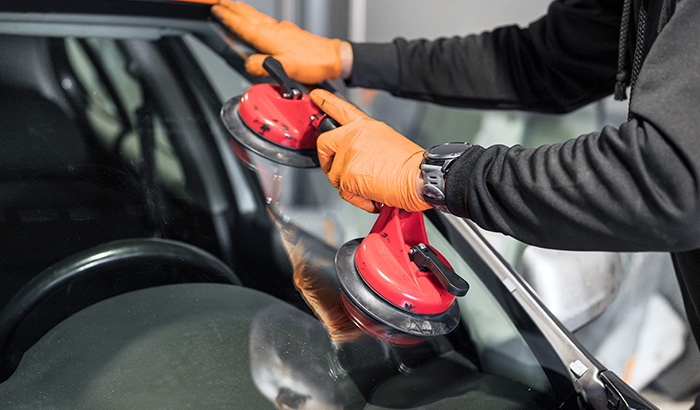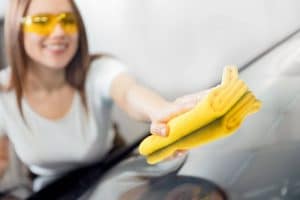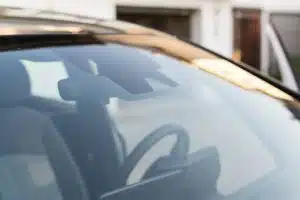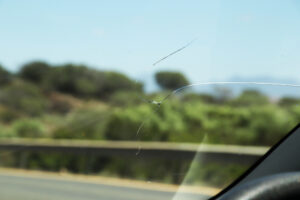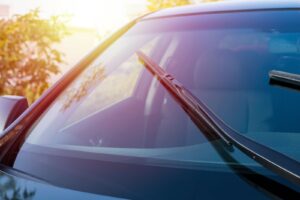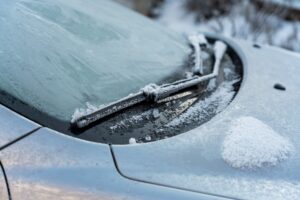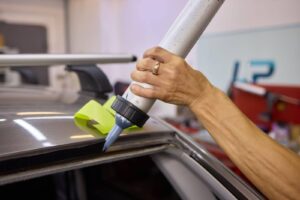Properly maintaining your auto glass is essential for your vehicle’s safety, visibility, and overall appearance. This comprehensive guide ensures your auto glass stays in top condition for years.
- Regular Cleaning: Clean your auto glass at least weekly to remove dirt, dust, insects, bird droppings, and other debris. Use a dedicated automotive glass cleaner or create your solution by mixing a few drops of mild dish soap with water. Avoid harsh chemicals, which can damage the glass surface and surrounding trim. Spray the glass cleaner on the glass and use a microfiber cloth to wipe it in a circular motion, ensuring you cover the entire surface. For stubborn stains, let the cleaner soak for a few minutes before gently scrubbing the area.
- Microfiber Cloth: Always use a high-quality microfiber cloth designed for cleaning glass. Avoid using paper towels or regular cloths, as they can leave lint or scratch the glass surface. Ensure the cloth is clean and free of debris before each use. If the cloth becomes dirty during cleaning, switch to a clean one to prevent spreading dirt or grime.
- Avoid Extreme Temperatures: Sudden extreme temperature changes can cause stress on your auto glass, leading to cracks or chips. Avoid pouring cold water on a hot windshield in the winter or using a defroster at full blast when the glass is freezing. Instead, start the defroster on a low setting and gradually increase it as the glass warms up.
- Use Appropriate Tools: When removing ice or debris from your auto glass, use a soft plastic or silicone-bladed scraper. Avoid using metal or sharp-edged objects, as they can scratch or chip the glass. Start from the edges and work toward the center to minimize the risk of damage.
- Inspect for Chips and Cracks: Perform a thorough inspection of your auto glass at least once a month. Look for small chips, cracks, or pits that might have appeared since your last inspection. Check all the windows, windshield, and rear glass carefully. Even minor damage should not be ignored, as it can worsen over time and compromise the integrity of the glass.
- Address Chips Promptly: If you notice a chip on your windshield, get it repaired as soon as possible. Many auto glass repair shops can fix minor chips using specialized resin, preventing further spreading and avoiding the need for a complete windshield replacement. Timely repairs can save you money and preserve the structural strength of the glass.
- Avoid Slamming Doors: Handle your car doors carefully when opening and closing them. Slamming the doors can create vibrations that stress the glass and may lead to cracks, especially if a chip or minor damage already weakens the glass.
- Replace Worn Wiper Blades: Inspect your wiper blades regularly and replace them at least once or twice a year, depending on their condition and usage. Old or damaged wiper blades can leave streaks or scratches on the glass surface, impairing visibility during rain or snow.
- Keep Wiper Fluid Reservoir Full: Ensure your vehicle’s wiper fluid reservoir is always filled with an appropriate windshield washer fluid. Running the wipers without enough fluid can cause the blades to scratch the glass surface and reduce effectiveness.
- Park in Shade: Whenever possible, park your vehicle in shaded areas, such as garages or carports, to reduce sun exposure. Prolonged exposure to direct sunlight can weaken the glass over time, making it more susceptible to cracks and damage.
- Avoid Using Ammonia on Tinted Glass: If your vehicle has tinted windows, avoid using cleaners containing ammonia, as it can damage the tint film and lead to discoloration or bubbling. Instead, use a mild, ammonia-free glass cleaner designed for tinted windows.
- Protect From Hail and Debris: During storms or strong winds, park your car in a covered area whenever possible to protect the glass from potential hail damage or flying debris. If you don’t have access to covered parking, consider using a car cover to shield your vehicle during severe weather.
- Inspect Door and Window Seals: Regularly inspect the rubber seals around your auto glass for signs of wear, tear, or damage. Damaged or worn-out seals can allow water and debris to enter, potentially causing damage to the glass and leading to leaks inside the vehicle.
- Avoid DIY Repairs for Major Damage: While small chips can be repaired with DIY kits, major glass repairs and replacements should be left to professionals. Properly installing new glass is crucial for the structural integrity of your vehicle, as poorly fitted glass can compromise safety in case of an accident.
- Avoid Parking Under Trees: Parking under trees exposes your auto glass to the risk of falling branches, acorns, sap, and other debris that can be difficult to remove and may cause scratches or damage.
- Use Windshield Sun Shade: In intense sunlight, use a windshield sunshade to protect the glass and reduce interior heat buildup when parking your car. This will keep the glass in better condition and protect your car’s interior from sun damage.
- Follow Proper Towing Procedures: If your vehicle needs towing, make sure the towing company follows proper procedures to avoid glass damage during the process. Improper handling or securing of the vehicle can lead to cracks or chips in the glass.
- Maintain Door and Window Mechanisms: Ensure your door and window mechanisms are well-maintained and properly lubricated to prevent excessive force or misalignment that could stress the glass. Regularly inspect and address any issues with your vehicle’s window regulators or door hinges.
- Avoid Harsh Chemicals: Refrain from using harsh chemicals, such as acetone, bleach, or abrasive cleaners, near your auto glass. These substances can damage the glass surface, seals, and surrounding trim, leading to costly repairs or replacements.
- Address Interior Condensation: Condensation on the interior of your auto glass can occur due to temperature and humidity changes. Address it promptly, as prolonged exposure to moisture can lead to mold growth, which can damage the glass and seals over time.
By diligently following these detailed steps, you can ensure your auto glass remains in pristine condition, providing you with clear visibility, safety, and an aesthetically pleasing appearance for your vehicle.
Utah Mobile Auto Glass
Whatever windshield issue you face, the best thing to do is leave windshield replacement or repairs to a professional, which is where Utah Mobile Auto Glass comes in.
We have trained technicians ready and willing to share their knowledge and expertise with you about alleviating your windshield woes. Contact us, and let’s replace your windshield today!
toto slot

